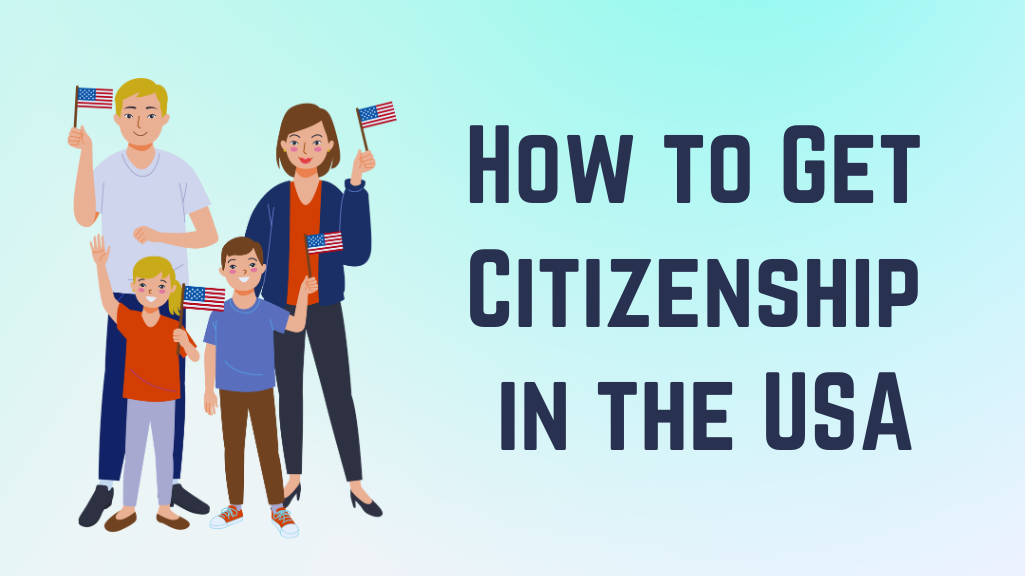Becoming a U.S. citizen is the dream for many immigrants. It’s more than a piece of paper—it’s about securing rights, opportunities, and stability for yourself and your family. But the process is a commitment, requiring time, effort, and sometimes a good amount of patience.
This detailed guide will walk you through every step, clarify the differences between a green card and citizenship, and provide the ways to become a US citizen.
What Does U.S. Citizenship Mean?
U.S. citizenship is the highest legal status you can attain in the United States. While permanent residents (green card holders) enjoy a wide range of privileges, becoming a U.S. citizen unlocks even more benefits and responsibilities. Here’s a breakdown of what citizenship grants you:
Rights Exclusive to U.S. Citizens

- Voting Rights: Only U.S. citizens can vote in federal elections, giving you a direct influence on the country’s leadership and future policies.
- Federal Jobs: Many government positions, especially those related to national security, require U.S. citizenship. If you’re interested in working for the federal government, citizenship is often a must.

- Jury Duty: Although it may not seem exciting, serving on a jury is a vital civic duty that only U.S. citizens are called upon to fulfill. It’s your chance to participate directly in the judicial process.
- Sponsorship Power: U.S. citizens can sponsor their immediate family members—such as spouses, children, and parents—for green cards without enduring the long waiting times that permanent residents face.
- Deportation Immunity: Unlike green card holders, U.S. citizens cannot be deported. This means that once you’re a citizen, you have a guaranteed right to remain in the country, regardless of circumstances.
Green Card vs. Citizenship
It’s important to understand the key differences between having a green card and being a citizen.
Here's the table contains a side-by-side comparison:
Feature | Green Card Holder | U.S. Citizen |
Legal Status | Permanent resident; can live and work indefinitely. | Full U.S. citizen with all constitutional rights. |
Voting Rights | Cannot vote in federal elections. | Can vote in federal, state, and local elections. |
Travel Freedom | Must renew reentry permit for trips over 1 year. | Can travel abroad freely with a U.S. passport. |
Deportation Risk | Can be deported for serious crimes or prolonged absences. | Cannot be deported. |
Sponsorship | Limited ability to sponsor family members. | Can sponsor more relatives with faster processing. |
Government Jobs | Many positions are off-limits. | Eligible for federal jobs, including high-security roles. |
 The Big Question: Should You Upgrade?
The Big Question: Should You Upgrade?
If you’re a green card holder eligible for citizenship, upgrading is often worth it. Citizenship offers greater security—you're protected from deportation and won’t lose your status like a green card holder might. It also opens up opportunities like voting, applying for federal jobs, and quicker family reunification. Plus, with citizenship, you don’t need to worry about renewing your green card. Ultimately, the benefits of security, opportunities, and full integration into American life make citizenship a valuable upgrade.
Check this article: 9 Ways to Get Your Green Card
Paths to U.S. Citizenship
Now that you understand why citizenship is worth it, let’s explore how you can achieve it. There are five main pathways:
1. Citizenship by Birth
Citizenship by birth, also known as jus soli, is one of the simplest and most straightforward paths to becoming a U.S. citizen. If you are born on U.S. soil or in certain U.S. territories—such as Puerto Rico, Guam, or the U.S. Virgin Islands—you automatically acquire U.S. citizenship, regardless of the nationality of your parents. There’s no need for you to file any paperwork, take any tests, or meet additional eligibility criteria. This provision is granted by the 14th Amendment to the U.S. Constitution, which ensures that anyone born within the country’s borders is a U.S. citizen.
However, there are some exceptions, such as children born to foreign diplomats or enemy forces, who may not receive citizenship under this rule. For the vast majority of people born in the U.S., though, the process is automatic and immediate.
2. Citizenship Through Parents (Acquisition)
If you were born outside of the U.S. but have at least one parent who is a U.S. citizen, you may already be a U.S. citizen by acquisition. This type of citizenship doesn’t require you to go through the naturalization process, but you will need to prove your eligibility. To claim U.S. citizenship through your parents, there are a couple of key requirements you must meet:

i. Prove your parent’s U.S. citizenship at the time of your birth:
Your parents must have been a U.S. citizen when you were born, whether by birth or naturalization.
ii. Demonstrate that your parent lived in the U.S. for a specific period before your birth:
The length of time your U.S. citizen parent resided in the U.S. before your birth is an important factor. Generally, a U.S. citizen parent must have lived in the U.S. for at least five years before your birth, with at least two of those years being after they turned 14. This requirement can vary depending on the exact circumstances, including whether you were born before or after certain dates.
If you're uncertain about your eligibility or need to gather specific documentation, it’s a good idea to consult the U.S. embassy or consulate in your country of residence. They can guide you through the process of proving your citizenship and help you secure the appropriate documentation, such as a U.S. passport or Consular Report of Birth Abroad (CRBA).
3. Citizenship Through Naturalization
Naturalization is the most common route for immigrants to become U.S. citizens. To qualify, you must have been a green card holder for at least five years (three years if married to a U.S. citizen), with at least 30 months of physical presence in the U.S. during that time.
Naturalization grants full citizenship benefits, such as voting rights, eligibility for federal jobs, and protection from deportation. While the process requires time and effort, it leads to full integration into American society.

4. Citizenship Through Marriage
If you're married to a U.S. citizen, you may be eligible for naturalization after just three years of permanent residency, instead of the usual five years. This benefit is available to couples who have been married and living together as spouses for at least three years.
However, the U.S. Citizenship and Immigration Services (USCIS) will closely scrutinize the authenticity of your marriage. You’ll need to provide evidence that your relationship is genuine, such as joint financial documents, shared property ownership, or other proof of a committed partnership
See also: Bringing Guide of Your Spouse to the U.S. as an International Student
5. Citizenship Through Military Service
Serving in the U.S. military can fast-track your path to citizenship. For individuals who have served in the armed forces, there are special provisions that allow you to apply for U.S. citizenship more quickly. In fact, non-permanent residents who enlist during wartime can often apply for citizenship even while still serving, bypassing some of the standard residency and green card requirements.
The U.S. government recognizes the sacrifices made by military personnel and offers expedited naturalization in return. Depending on your service, you may be eligible to apply for citizenship immediately after completing basic training or upon discharge, if you meet the necessary conditions.

Naturalization
Naturalization is the process most people take to become U.S. citizens. Here’s a breakdown:
Eligibility Criteria for Naturalization
- Green Card Holder for 3–5 Years:
- 3 years if married to a U.S. citizen.
- 5 years for everyone else.
- Physical Presence:
You must have lived in the U.S. for at least 30 months out of the last 5 years. - Continuous Residency:
Avoid trips longer than 6 months outside the U.S., or you might reset your clock. - Good Moral Character:
USCIS will review your criminal record, tax history, and any other activities that might reflect poorly on your character. - English and Civics Knowledge:
You’ll need to demonstrate basic English reading, writing, and speaking skills, along with knowledge of U.S. history and government.
Over 800,000 people became naturalized U.S. citizens in 2021. The top countries of origin for new citizens are Mexico, India, and the Philippines. California, New York, and Texas have the highest naturalization rates.
Step-by-Step Naturalization Process
Here’s how to become a U.S. citizen through naturalization:
Step 1: File Form N-400
- Cost: $725 (includes $640 application fee and $85 biometrics fee).
- File online or by mail.
- Fee waivers are available for low-income applicants.

Step 2: Biometrics Appointment
After you submit your application, USCIS will schedule you for a biometrics appointment. During this appointment, they will collect your fingerprints, photograph, and signature to conduct a background check. This process usually takes place within a month of your application being filed.
Step 3: Prepare for the Civics and English Tests
After you submit your application, USCIS will schedule you for a biometrics appointment. During this appointment, they will collect your fingerprints, photograph, and signature to conduct a background check. This process usually takes place within a month of your application being filed.
Step 4: Attend the Interview
Once you’ve prepared for the tests, the next step is the naturalization interview. During the interview, a USCIS officer will review your application, ask questions about your background, and test your knowledge of U.S. civics and English. Be honest and thorough in your answers.
Step 5: Take the Oath of Allegiance
After you pass the tests and interview, you’ll be scheduled for the Oath of Allegiance ceremony. This is the final step in the naturalization process, where you officially pledge loyalty to the United States. Once you take the oath, you will become a full U.S. citizen, gaining all the rights and responsibilities that come with that status.
USCIS welcomed 878,500 new citizens during naturalization ceremonies held across the United States and around the world. USCIS
Citizenship: Marriage and Military Service
Marriage to a U.S. Citizen
The timeline for citizenship shortens to 3 years if you’re married to a U.S. citizen. Here’s what USCIS will want:
- Proof of a bona fide marriage (photos, joint accounts, lease agreements).
- You must live in the U.S. for 3 years before applying and avoid extended absences.

Military Service
Military service offers a quicker route to citizenship, with different rules depending on peacetime or wartime service:
- Peacetime: You need to serve for at least 1 year and hold a green card.
- Wartime: You can apply for citizenship without a green card.
Military service members also enjoy fee exemptions for naturalization. Serving in the military is one of the fastest ways to gain U.S. citizenship, with benefits for both peacetime and wartime veterans.
Check: Unlocking Career Success as an International Student
Costs and Processing Times
Costs
- Naturalization fee: $725.
- Fee waivers: Available for applicants with financial hardships.
Processing Time
- Total time: 8–14 months on average.
- Biometrics: 1 month.
- Interview and test: 6–12 months.
- Oath ceremony: 1–2 months.

Common Challenges
1. English or Civics Test Failures:
Failing the English or civics test is a common hurdle for applicants. Fortunately, you can retake the tests within 60 to 90 days of the initial attempt. Make sure to review study materials provided by USCIS, such as sample questions for the civics test and English practice tools. Consider enrolling in a language class or civics prep course to improve your chances the second time around.
2. Application Denials:
If your application is denied, USCIS will provide a detailed explanation for the rejection. Common reasons include incomplete information, failure to meet residency requirements, or issues with your criminal history. After understanding the cause, you can correct the issues, gather the necessary documents, and reapply. Consulting with an immigration lawyer can help clarify complex cases and ensure your next application is more thorough.
3. Long Processing Times:
Naturalization applications can take time, often extending several months or even a year. To overcome long processing times, it's important to file early and track your case online through the USCIS portal. Stay organized and ensure you have all the required documents to avoid delays. If your application is taking longer than expected, consider reaching out to USCIS for updates or help.
Among those naturalized, the leading countries of origin were Mexico, India, the Philippines, the Dominican Republic, and Cuba. El País
FAQs
1. What are the advantages of U.S. citizenship over a Green Card?
U.S. citizenship provides more stability and privileges compared to a Green Card. Citizens enjoy permanent residency without the need for renewal, the right to vote in federal elections, the ability to sponsor a wider range of family members for immigration, and protection from deportation. Green Card holders must renew their status every 10 years and risk losing it if they commit certain violations.
2. Can I maintain my U.S. citizenship if I live outside the country long-term?
Yes, U.S. citizens can live abroad without losing their citizenship. However, there are important conditions to keep in mind: if you live outside the U.S. for extended periods or have significant ties to another country, it could complicate matters such as taxes, voting, or re-entry into the U.S. Citizens are required to file U.S. tax returns even if they live abroad.
3. How does the process differ if I apply for citizenship through marriage versus military service?
If you’re married to a U.S. citizen, you can apply for citizenship after only 3 years of permanent residency, instead of the typical 5 years. In contrast, military service may allow you to apply for citizenship even during wartime without a Green Card and receive expedited processing. Both routes require proving eligibility, but marriage requires documentation of a valid, genuine relationship, while military service may have fewer bureaucratic hurdles.
4. What specific documents do I need to prove my eligibility for citizenship?
When applying for U.S. citizenship, you’ll need to provide documents such as your Green Card, birth certificate, marriage certificate (if applying through marriage), proof of residence, and financial or tax records to show your continuous stay. Additionally, if applicable, you may need to show military service records or proof of any prior legal matters.
5. Can I lose my citizenship if I make a mistake during the naturalization process?
It’s rare for someone to lose their citizenship simply because of an error during the naturalization process. However, intentional fraud or providing false information on your application can lead to denial or even revocation of citizenship. Honesty and transparency are critical, and mistakes that are corrected quickly are generally not an issue.
6. Do I have to prove English proficiency if I’m over a certain age?
Yes, U.S. citizens over the age of 50 (with at least 20 years of U.S. residency) or 55 (with at least 15 years of U.S. residency) are exempt from taking the English test for citizenship. However, they still need to pass the civics portion of the exam. This exemption helps older applicants who may have had difficulty learning English.
